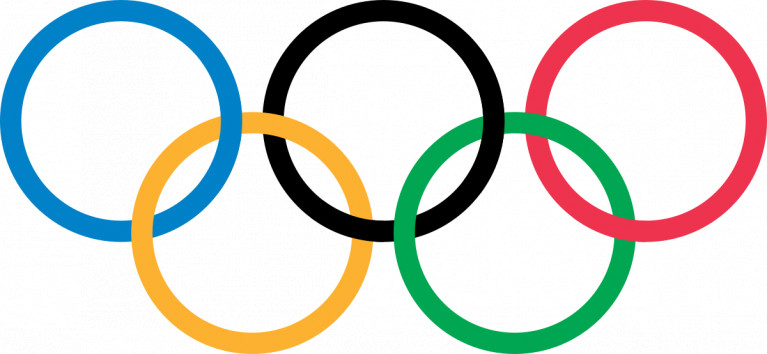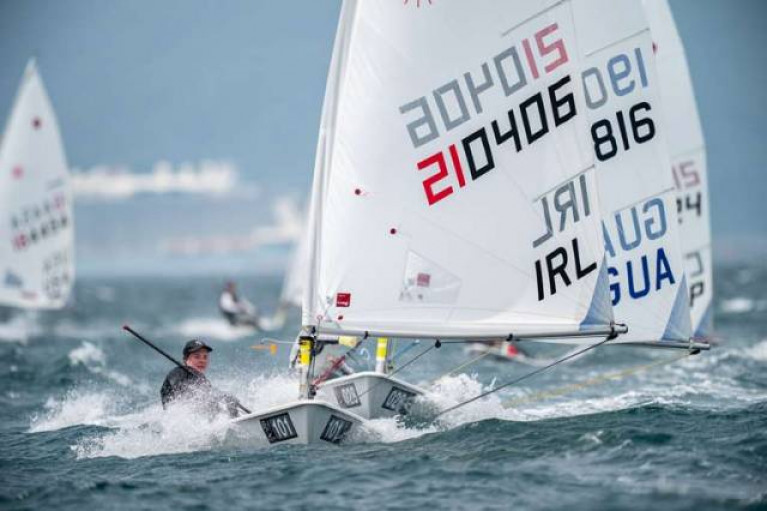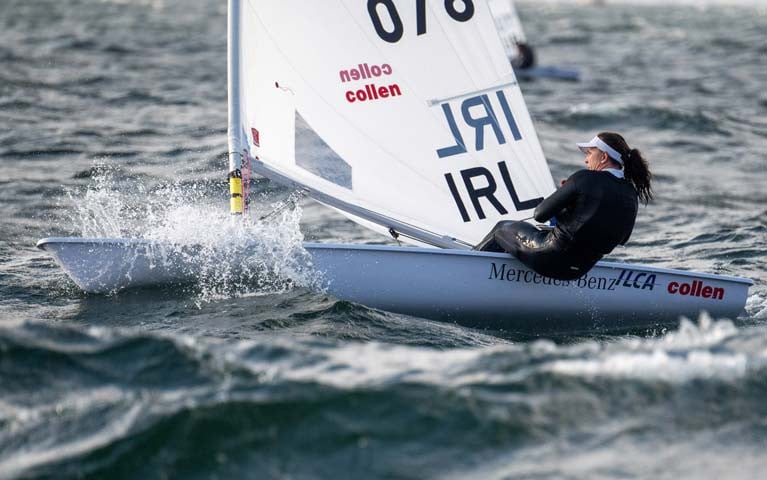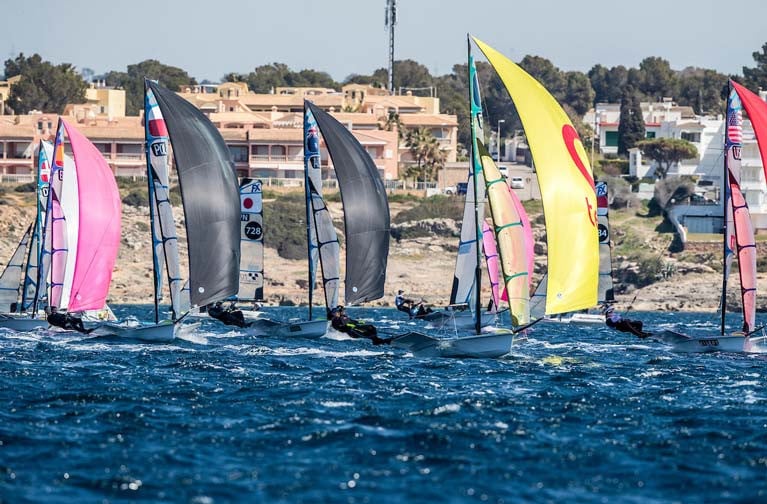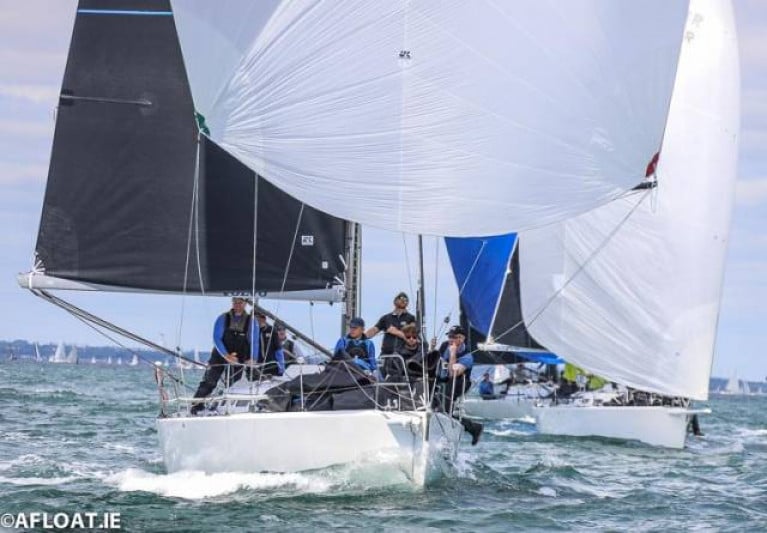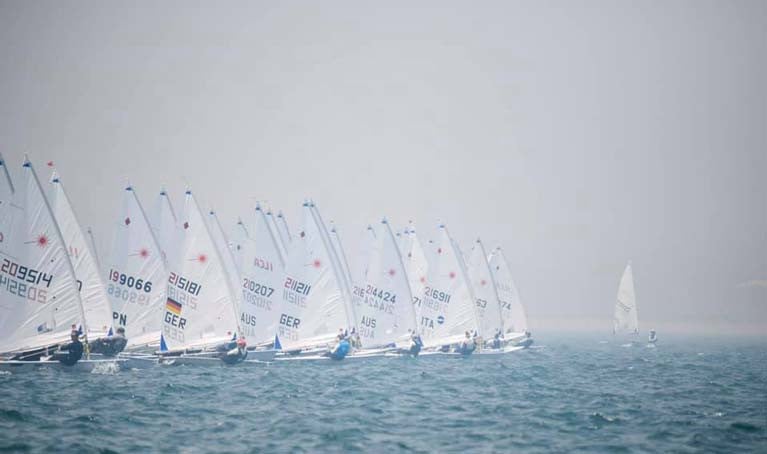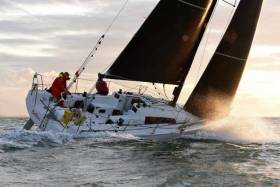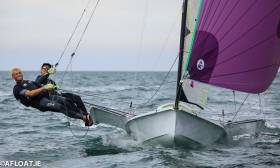Displaying items by tag: Olympic
IOC Urges all International Federations to Relocate or Cancel Their Sports Events Currently Planned in Russia or Belarus
The Executive Board (EB) of the International Olympic Committee (IOC) reiterated today the IOC’s strong condemnation of the breach of the Olympic Truce by the Russian government and the government of Belarus through its support in this. The respective UN resolution was adopted by the UN General Assembly on 2 December 2021 by consensus of all 193 UN Member States. The Olympic Truce began seven days before the start of the Olympic Games, on 4 February 2022, and ends seven days after the closing of the Paralympic Games.
The IOC EB today urges all International Sports Federations to relocate or cancel their sports events currently planned in Russia or Belarus. They should take the breach of the Olympic Truce by the Russian and Belarussian governments into account and give the safety and security of the athletes absolute priority. The IOC itself has no events planned in Russia or Belarus.
In addition, the IOC EB urges that no Russian or Belarussian national flag be displayed and no Russian or Belarussian anthem be played in international sports events which are not already part of the respective World Anti-Doping Agency (WADA) sanctions for Russia.
At the same time, the IOC EB expresses its full support to the International Paralympic Committee (IPC) for the upcoming Paralympic Winter Games Beijing 2022.
The IOC EB expresses its deep concerns about the safety of the members of the Olympic Community in Ukraine and stands in full solidarity. It notes that the special IOC task force is in contact with the Olympic Community in the country to coordinate humanitarian assistance where possible.
The IOC EB asks the task force to continue to closely monitor the situation and to keep the IOC EB informed and updated, also with regard to potential amendments of today’s resolution.
The Olympic Flame is now well into its progression through Japan, on a Marathon of Marathons which is seeing runners of every shape and size and type carry it into all of the 47 Prefectures which make up that most enigmatic of archipelagos. For Japan is a country which – just as you feel you're beginning to understand it – seems to fade behind yet another veil of the unknown.
But as it is, we've more than enough unknowns to take into account for what we now have to acknowledge, with an effort of memory, is actually the 2020 Olympiad being formally launched in Tokyo in 98 days time in July 2021. And not least of those unknowns is the reaction of the people of the host country, as to whether or not the games should be staged at all in these pandemic times.
Having seemed to avoid the worst of COVID in the early days, Japan is now in something of a surge, yet only 1% of the population have been vaccinated as of this week. Of course, all the visiting athletes will have been vaccinated, and doubly or even trebly certified as coronavirus-free. But as the progression of the Olympic Flame has been largely unobserved other than by camera crews, the people of Japan have not only provided significant anti-Games majorities for a whole slew of opinion polls, but they seem have reverted to a natural state of isolation which – let's face it – was their normal way of life even in infection-free times.
Many of the Olympic events will in any case be taking place before restricted or non-existent crowd numbers, and overseas visitors will be severely limited. So for once sailing's relatively isolated status – in this case at Enoshima rather than in the main focus of events in Tokyo – may seem initially to be a real advantage. On the other hand, if the Japanese Anti-Games Protest movement really does get up a head of steam, Enoshima's relatively remote position might make it a target for roving mobs of demonstrators driven away from the Capital.
Obviously, that's a worst-case scenario, meanwhile, in the seemingly eternal count-down process, Irish sailing has been gradually strengthening its position, with the re-assuring place for Annalise Murphy in the Women's Radial Laser now underpinned by the position gained by Robert Dickson and Sean Waddilove in the 49er in last month's series at Vilamoura, perfectly rounded out with their Medals Race victory, which was Olympic standard.
 Reassuring presence – Annalise Murphy winning Silver in the 2016 Olympics at Rio
Reassuring presence – Annalise Murphy winning Silver in the 2016 Olympics at Rio
That superb closing performance must owe something to the fact that the pressure was off, for they had their place already. So all they had to do in the Medals Race was sail and sail and then sail some more, and enjoy it while they were at it, and there are few better ways of enjoying a race than winning it in such cool style.
So now the final searchlight swings to Finn Lynch, as mentioned in yesterday's Afloat with his two-in-seventeen chance of getting Ireland the remaining Laser Men's slot. But just how you can transfer that carefree joy which provided the glorious Dickson/Waddilove win across to a solo Laser sailor with a mountain to climb under a weight of expectation heaven only knows, yet maybe it can be done, and some day it might make for a thesis or two in sports psychology studies.
 Current Tokyo lineup – Annalise Murphy, Robert Dickson and Sean Waddilove Photo: WM Nixon
Current Tokyo lineup – Annalise Murphy, Robert Dickson and Sean Waddilove Photo: WM Nixon
As for the tensions inevitable in the interrupted Olympic countdown and selection process, if it's any consolation there have been previous Olympics where the world in general has somehow emerged from a period of utter blackness to stage a successful Games.
For instance, the 1916 Games were supposed to be held in Germany, but they didn't happen as the main contest that year was the Battle of the Somme at the height of the Great War of 1914-1918. Thus the next Olympic Games were held in 1920, with the world still reeling from the devastating effects of the Spanish Flu Pandemic of 1918-1920 coming right on after the wholesale death and destruction of the Great War.
Anyone who thinks it's mildly heroic to manage an Olympic Games in 2021 pandemic conditions would do well to remember 1920. The chosen city was Antwerp, while Ostend was selected for the sailing events. Either way, it was very much Belgium which was the host country, gallant little Belgium had suffered most destruction in the Great War, yet the Belgians managed to pull themselves together and stage the first post World War 1 Olympic Games.
However, what with a War of Independence soon to be followed by Partition and then a Civil War, Ireland's attention was elsewhere at the time, yet for some Cork sailors, the 1920 Sailing Olympics in Belgium had a special interest.
In July 1914, the Commodore of the Royal Munster Yacht Club, Arthur Sharman Crawford, had appeared in Cowes with one of the first boats built to the International Metre Rule to carry the new-fangled bermudan rig, the Fife-designed-and-built Ierne.
 Gold Medal Winner. The restored 8 Metre Ierne was originally designed and built in 1913-14 by William Fife for Royal Munster YC Commodore Arthur Sharman Crawford. But when she won the Gold Medal in the 1920 post-Great War, post Spanish Flu Olympics, she had moved into Norwegian ownership
Gold Medal Winner. The restored 8 Metre Ierne was originally designed and built in 1913-14 by William Fife for Royal Munster YC Commodore Arthur Sharman Crawford. But when she won the Gold Medal in the 1920 post-Great War, post Spanish Flu Olympics, she had moved into Norwegian ownership
The outbreak of the Great War at the end of July meant that Cowes Week was cancelled, but Ierne had already done enough to show that she was one of the hottest Eights around, and after the war she would have been a prime contender for the British place in the Eight Metre Class in the Belgian Olympics.
However, with advancing age and the difficult situation in Ireland, Arthur Sharman Crawford had sold Ierne to Carl Ringvold of Norway, who was duly selected to race for Norway in those 1920 Olympics, and won the Gold Medal.
 Ierne in race-winning form, July 1914
Ierne in race-winning form, July 1914
We can only imagine what Arthur Sharman Crawford – a man who contributed so much to the commercial and technical development of Cork city – must have felt about this result. "Mixed feelings" would be the least of it. Hover, perhaps we should remember that in 1920, the Olympic Games weren't quite the all-consuming global passion that they've become today, but they were certainly moving in that direction when the first post-World War II Games were staged in 1948, with London the host city and the sailing events staged at Torquay.
Everything was at a much more intense level as the last pre-war Games had been the meretriciously glittering show which was "The Hitler Olympics" in Berlin in 1936. The organisers of the London Olympics were determined to show clearly just who had won World War II, so those Irish sailors such as Billy and Jimmy Mooney, who had been thinking it was time Ireland mounted her own separate Olympic sailing challenge, felt they might find things difficult.
This was reinforced by many of their fellow yachtsmen in their home port on Dublin Bay still talking of it as "Kingstown", with two of the club ensigns continuing to display the union flag. But Billy Mooney and Douglas Heard had some high-powered contacts in the British sailing establishment, and far from being discouraged, the idea of an Irish team was greeted with enthusiasm in London as numbers were otherwise looking thin for the Torquay regatta in the post-World War II austerity.
 Billy Mooney at the helm of the 74ft Mylne yawl Mariella in 1949. A consummate diplomat in sailing, he helped the establishment of the Irish Yachting Federation in 1947 in order to have the first Irish Olympic Sailing Challenge in 1948.
Billy Mooney at the helm of the 74ft Mylne yawl Mariella in 1949. A consummate diplomat in sailing, he helped the establishment of the Irish Yachting Federation in 1947 in order to have the first Irish Olympic Sailing Challenge in 1948.
However, an Irish team would need some sort of national authority to seek recognition from, and affiliation to, the International Yacht Racing Union. Fortunately, the groundwork on this had already been done by J J O'Leary, Commodore of the National Yacht Club in Dun Laoghaire, who had called a preliminary meeting on November 29th 1946 to explore the establishment of a representative body, and it was attended by 22 clubs represented by such leading sailing luminaries as Sean Hooper, Peter Odlum and Terry Roche.
Thus it came about that in the period 1947-48, there were three organisations looking after Irish sailing at a national level. The 1946-founded Irish Dinghy Racing Association was the most active on the developmental front, but for general affairs, the leading clubs still looked to the Yacht Racing Association (in 1953 to become the Royal Yachting Association) in London. Yet on July 4th 1947 at a meeting in the Royal Marine Hotel in Dun Laoghaire, the Irish Yachting Federation was brought into being primarily for the purpose of sending an Irish team to the 1948 Olympics.
The officers elected were Harry Donegan Jnr. (Royal Cork YC & Royal Munster YC) as Chairman, and Hon. Sec. Errol McNally (National YC), with a usefully representative committee. But the new IYF had been in existence for barely a couple of hours before it was struck by tragedy.
Its launching had been timed to coincide with a major regatta at the Royal St George YC followed by a combined Irish Cruising Club/Clyde Cruising Club/RORC race from Dublin Bay to the Clyde, and Harry Donegan had brought his 50ft Clyde 36 Sibyl round from Cork to take part. A near-gale came up on that Friday night, and despite being in Dun Laoghaire harbour, a sufficiently steep and breaking sea had built up to overpower Sibyl's dinghy when the crew were returning in the dark to spend the night on board, and it became the accident in which Harry Donegan Jnr was drowned.
For those left behind, the only course of action was to continue, and in the Autumn J J O'Leary and Billy Mooney went to London to formalise the IYF's separate identity with both the YRA and the IYRU. Nevetheless it's difficult to escape the feeling that new organisation's existence – already a matter of contention among Kingstown-minded Dun Laoghaire-based traditionalists – was permanently blighted by the Donegan tragedy, and within a year of the 1948 Olympics, the relevant functions of the IYF were subsumed into the Irish Dinghy Racing Association which developed over the next decade into being the nascent national authority with responsibility for the Olympic representation.
 The Firefly Dinghy was designed as a two-hander, but for the 1948 Olympics it became the solo sailed boat……….
The Firefly Dinghy was designed as a two-hander, but for the 1948 Olympics it became the solo sailed boat……….
 ……..with mixed results
……..with mixed results
Nevertheless in its brief existence the IYF provided the focus for the 1948 Irish Olympic Sailing Challenge, with Jimmy Mooney racing the Firefly which was selected for the single-handed boat, while Alf Delany and Hugh Allen raced the two-hander, the 26ft Swallow Class sloop which was loaned to them by ex-Pat yacht designer O'Brien Kennedy who - it subsequently emerged - was actually the detail designer of the Swallow, even if Tom Thornycroft was credited with the overall concept.
The selection of a two-handed dinghy like the Firefly to be the solo sailing boat was in line with the host country's insistence that the 1948 Olympics be as British as possible regardless of the boat's suitability, for the Swallow was essentially a three man boat.
 The three-man Swallow Class proved a very demanding two-hander at the 1948 Olympics
The three-man Swallow Class proved a very demanding two-hander at the 1948 Olympics
However, the most extreme example of this British bias came in the Dragon Class, where their representative was Eric Strain from Royal North of Ireland YC in Cultra. Eric Strain was not at all averse to taking an all-Ireland view of sailing, for in 1946 he had gallantly but briefly tried to publish a little journal called The Irish Yachtsman. But as a hugely-talented helmsman, he was supported by a relative, Billy Barnett, an affluent engineer, who was the owner of the Dragon Class Ceres, built in Sweden by Johannsen.
In 1947 racing on the Clyde with Ceres, Eric Strain won what was then the class's supreme trophy, the Gold Cup, and as a result was selected to be the British representative in the Dragon Class at Torquay in 1948.
This was popular for all Irish sailors, but what nobody realised was that the YRA insisted that Eric Strain should race a British-built Dragon at Torquay, and thus he and his crew spent the first half of the 1948 season trying to get up to speed with the new Ceres II - beautifully built by Camper & Nicholson perhaps, but not a patch on the quintessentially Swedish Ceres I in terms of performance.
 In order to set the 1948 Sailing Olympics in Torquay in their historical context, the Opening Party was held aboard the battleship HMS Anson, when the 221 participating sailors were joined by many friends
In order to set the 1948 Sailing Olympics in Torquay in their historical context, the Opening Party was held aboard the battleship HMS Anson, when the 221 participating sailors were joined by many friends
Any suggestion they might revert to Ceres I was instantly smothered. But though they did get a commendable fourth overall with Ceres II at Torquay in 1948, the thought of what they might have done with Ceres I is one of those classically Olympic "what might have been" stories. They are dramas and sagas which we will doubtless see increased in number during 2021, as and if the Tokyo Olympics 2020 finally take place.
World Sailing, the world governing body of the sport, has received confirmation of financial support from the International Olympic Committee (IOC) following constructive dialogue.
The IOC is supporting World Sailing in addressing the challenges caused by the COVID-19 pandemic and the consequence on postponing the Tokyo 2020 Olympic Games.
In the challenging times experienced as a consequence of COVID-19, World Sailing has engaged with the IOC on how best to address the impact experienced within the sport with detailed and transparent discussions.
“Receiving the support and the encouragement from IOC President Dr. Thomas Bach means a lot for World Sailing,” commented World Sailing President, Kim Andersen. “I am looking forward to continuing the great partnership between the IOC and World Sailing with a focus on our great sport and our sailors.”
The financial support will enable World Sailing to continue plans for developing and promoting sailing worldwide and delivering the highest standards for the Tokyo 2020 and Paris 2024 Olympic Games.
A cut-short Olympic trial in the women's Laser Radial class has handed trials leader and Rio silver medalist Annalise Murphy selection for the Tokyo Olympics as Afloat reports here. News of this week's decision, however, has left two of the trialists, Aoife Hopkins and Aisling Keller, 'upset' and 'devasted' and questioning why the decision was ratified by the Irish Sailing board with the postponed Olympic Games still over a year away.
A third trialist, Irish Sailing Academy sailor Eve McMahon, says the circumstances of COVID-19 could not be foreseen and the trial, in so far as it went, was a 'tremendous experience' for her.
The remaining two Olympic trials events have been cancelled due to coronavirus and – as the four trialists were informed this week – selection has been based solely on the worlds from February, an event in which the National Yacht Club's Murphy finished 12th, well clear of her Irish rivals.
Keller of Lough Derg Yacht Club whose performance at the 2019 Australian World Championships qualified Ireland's only boat for the Tokyo Olympics so far, said she is "very surprised and upset that the remainder of the trials will not happen for the 2021 Olympics".
21-year-old Hopkins of Howth Yacht Club gave a similar reaction, "I really can’t understand the decision not to continue with the trials. I am utterly and completely devastated".
Both Hopkins and Keller were quick to take to social media to express their disappointment.
Both sailors say they were aiming to catch up in the next two trials after Murphy took the lead in the first of the three planned trials in a breezy world championships in Melbourne in February.
"Over the past few years, I’ve sacrificed a lot to fulfil my dream of becoming an Olympian. I am devastated to not even have the chance to try catch up to Annalise or Aoife over two more regattas, Keller says.
A third trialist, McMahon of Howth Yacht Club, current Gold Medal holder in the Laser Radial U17s World League after success in Canada joined the trial series at Christmas and told Afloat of the 'amazing opportunity to sail and train with the Olympic Radial Development Team'.
Read the full comments below
Team manager James O'Callaghan says "Annalise’s performance in the 2020 Worlds made her a clear favourite to win the scheduled trials. By nominating her now the Irish Sailing Board have ensured that team preparations can move focus to the Olympics rather than preparing for domestic trials”. He went on to say: “for sure this is tough on Aoife but she is still very young and can benefit massively from team training planned in Tokyo".
Murphy who returned to the Radial after failing to qualify for Tokyo in the 49erFX dinghy made an immediate impact on the Radial fleet, coming close to winning the Melbourne Worlds before finishing 12th after taking two penalties in final races.
Radial Reaction
 Aisling Keller - surprised and upset that the remainder of the trials will not happen for the 2021 Olympics
Aisling Keller - surprised and upset that the remainder of the trials will not happen for the 2021 Olympics
Aisling Keller: “On Monday I got a courtesy phone call to be informed that The Olympic spot had been given to Annalise. I am very surprised and upset that the remainder of the trials will not happen for the 2021 Olympics. Over the past few years, I’ve sacrificed a lot to fulfil my dream of becoming an Olympian. I am devastated to not even have the chance to try catch up to Annalise or Aoife over two more regattas. I was planning on doing these regattas independently i.e not with Irish sailing, as I had resigned from Irish sailing in April due to my own lack of progress and my unhappiness with how I had been treated. I would like to take this opportunity to thank all my supporters for everything over the past few years, especially everyone down in Lough Derg Yacht Club and my home town of Nenagh".
 Aoife Hopkins - taking some time out for reflection and to reassess
Aoife Hopkins - taking some time out for reflection and to reassess
Aoife Hopkins: “On Monday I was told that Irish Sailing did not intend to reschedule the remaining two trials events. I really can’t understand the decision not to continue with the trials. I am utterly and completely devastated. I am going to take some time out for reflection and to reassess. A huge amount of hard work, dedication, blood, sweat and tears went into this journey and I will use the next while to decide what direction my life will take. No matter what path I end up on, I will always be a sportswoman and an avid sailor, whether that be big boat or small! I would like to thank my family, friends and all my supporters both from within sport and the wider community, especially from my home town of Howth".
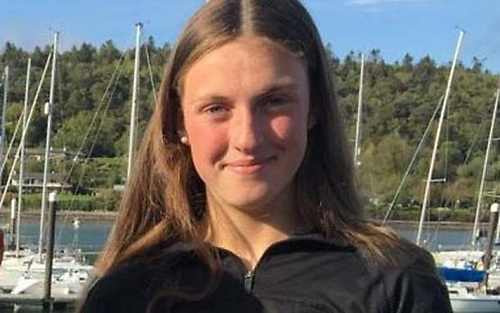 Eve McMahon - an honour and a privilege to be training alongside Annalise Murphy
Eve McMahon - an honour and a privilege to be training alongside Annalise Murphy
Eve McMahon: “I had an amazing opportunity to sail and train with the Olympic Radial Development Team. Training alongside the Olympic medallist Annalise Murphy was both an honour and a privilege for me and gave me tremendous inspiration and experience which helped me enormously during the run up to the 1st Olympic trial - Senior World Championships in Melbourne last February. The trial selection process was interrupted by the Covid 19 world pandemic, which nobody could have foreseen. Annalise was a whisker away from winning that World Championship. I fully support her selection and wish her the very best of luck in her Tokyo campaign and have great confidence that she has what it takes to bring back the gold medal for Irish sailing.”
Irish Olympic Sailing will be among sports contacted by the Olympic Federation for its views on Tokyo 2020 and a possible postponement.
As Afloat reported previously, Ireland so far has only one boat qualified for the Tokyo Regatta with two other disciplines in a scrap for final berths.
In recent weeks, nations around the world have been forced to rethink how they operate due to the global pandemic caused by Covid-19. Like all areas of society, sportspeople have had to adjust and adapt to these new norms.
The OFI is today contacting its Tokyo bound member federations, to get their views as follows:
- The current environment for their sport at elite level for those athletes tracking towards Tokyo.
- Restrictions to the training environment for their elite athletes.
- A general qualitative update on the current mood and any concerns that they have.
- On the basis that the OFI feels that Games are likely to be postponed, what is their current position on halting training sessions temporarily at this point?
Through the OFI Athletes Commission, contact will also be made with all athletes on the long list for Tokyo to assess the training restrictions of Irish athletes and their environments, as well as establishing a gauge of the major concerns of Irish athletes right now in this unprecedented situation.
The information will then be used to provide a country by country update that the IOC said it will be asking from all National Olympic Committees.
Speaking today OFI President Sarah Keane said,
“We have heard the latest update from the IOC regarding the Games, and we await in due course further information from them. However, we need to consider what’s right for our athletes, coaches, federations and all involved in supporting the system in Ireland at this time. This does include considering if our potential Olympians can and/or should continue to engage in organised training for the foreseeable future.
“This may go against the grain of what they are used to doing day in day out, however at this time all options must be considered which we will do in conjunction with our Member Federations, athletes, Sport Ireland and other stakeholders. We can and are providing input into the IOC as the ultimate decision-making body for the 2020 Olympic Games. However, we can make decisions in Ireland for the best of Team Ireland and all involved.”
Speaking today, Team Ireland Chef de Mission, Tricia Heberle said, “Our National Federations, our Performance Directors and athletes have responded incredibly well in the face of the Covid 19 pandemic. On the premise that Tokyo 2020 will be postponed, we now need to get their input before taking next steps.
Olympic athletes who require any additional support or guidance at this time should contact the OFI Athletes’ Commission Support officer Heather Boyle – [email protected] – these details were provided as part of a communication to athletes on the Tokyo 2020 long list last week.
Training Underway for Hundreds of Olympic Sailors in the Bay of Palma in Trofeo Princesa Sofía Warm-up
Organisers say there is intense activity already at the Trofeo Princesa Sofía Iberostar, to be held in the bay of Palma from 25th March to 4th April, especially at the venues of Club Nàutic S’Arenal and Club Marítimo San Antonio de la Playa. International sailing teams continue to arrive every day and there are already several hundreds of sailors training in waters of Mallorca to prepare for this regatta, considered as one of the best in the International Olympic calendar despite the threat of the Coronavirus threat. 11 people are currently recorded as having the virus on the Balearic islands, according to local media sources.
Teams from Japan, Australia, the US, Russia, Italy, Switzerland, France, Great Britain, Germany, Hungary and Croatia as well as Spanish sailors, have been doing their winter training since the end of January in the venues of the Trofeo Princesa Sofía Iberostar, specially classes 470, 49er, Nacra 17, Finn and Laser.
The largest fleet is undoubtedly the 470, both women and men, with over 80 teams. Club Nàutic S’Arenal will host the Class World Championship from 13th to 21st March, just before the Sofia Iberostar, so there will be much at stake in the bay of Palma.
Most 49er sailors (around 45 teams, men and women) are also in Mallorca after the end of the Class World Championship in Australia some weeks ago.
The same waves as in Tokyo 2020
The Trofeo Princesa Sofía Iberostar will be a selection event for some nations to decide the teams that will have the honour and responsibility of representing their country at the Tokyo 2020 Olympics so it will be a tense period for many from 30th March to 4th April, racing days in Palma.
For those who secure the Olympic spot for the Summer Games, the Sofía Iberostar has an added value: “If we are lucky to have the usual wind (SW) in the bay of Palma, with big waves, it would be as sailing in waters of Enoshima”, points out Santiago López-Vázquez, Olympic preparation Manager of the Spanish Sailing Federation (RFEV).
According to Mark Robinson, manager of the British Olympic Sailing Team, “Trofeo Princesa Sofia is a favourite amongst our sailors and the bay of Palma is the perfect venue. Our sailors look forward to training in the sun, wind and waves that Palma is famous for”. The large British team, including the Technical team members, are already at the Club venues after training in Portugal and taking part in some World championships held in the Southern Hemisphere.
Swiss sailors also appreciate the conditions in the bay of Palma. “The venue is awesome to train with many different conditions, and above all, a very good temperature in winter! We started training three days ago and for now, we had a good breeze and big waves, which is perfect to improve my weaknesses”, points out Eliot Merceron, Laser Standard sailor.
The top world sailors
“Everyone comes here because we know we will have great sailing conditions”, adds Sébastien Schneiter, Swiss 49er team skipper-. The 49er world’s best sailors are here”. His crew, Lucien Cujean, highlights that the Sofia Iberostar “enables you to judge if you did a good winter training. It’s always a good value for us in term of quality, racing, and time on the water!”
The Chief of the Spanish Navy also agrees with this view toward the Olympic Games: “The 51st edition of the Trofeo Princesa Sofía Iberostar, in this Olympic year, provides the best international regatta possible for the Spanish pre-Olympic team to test our nation’s preparation level, with scarcely four months left for the Tokyo 2020 Games”.
Racing kicks off on 26th March
The Dragon, ORC and one-design classes will open the Trofeo Princesa Sofía Iberostar. These fleets, based at Real Club Náutico de Palma, will race from 26th to 29th March. The Olympic Classes, with venues in Club Nàutic S’Arenal and Club Marítimo San Antonio de la Playa, will race from 30th March to 4th April, with the top sailors battling in the Medal Races, which score double points, on the last day.
Multinational hotel company Grupo Iberostar from Mallorca is the event’s main sponsor since 2015. Furthermore, the 51 Trofeo Princesa Sofía Iberostar has the collaboration of Marine Pool, Trasmediterránea, Europcar, Torqeedo and Palma Beach as well as the institutional support of the Balearic Government through the Balearic Islands Tourism Strategy Agency (AETIB), the Turisme Mallorca Foundation from Consell de Mallorca and Ports de Balears as well as Palma and Llucmajor city councils.
It is still possible to sail in Irish waters in your own cruiser-racer without involving enormous expense. You just have to be prepared to do it in a boat of economical size which is far from being the newest available. Admittedly you have to be skilled in your own maintenance in continuing to get full use from equipment which is well-proven through years of experience in its use. Then too, you have to be carefully selective in finding a mooring or berthing location which doesn’t cost the earth, and you have to be modest in your expectations of what you can achieve afloat, particularly if there are racing ambitions in the equation.
Of course, it is increasingly possible to sail in charge of a boat without having to own one. Talented potential Sailing Masters are soon identified by owners keen to win. And the development of boat rental is only in its infancy in much of Ireland on the sea coasts. Yet it’s obviously the only way to go for people with a reluctance to become too totally involved, their “rent it” approach reflecting today’s developing Tasting Menu Lifestyle.
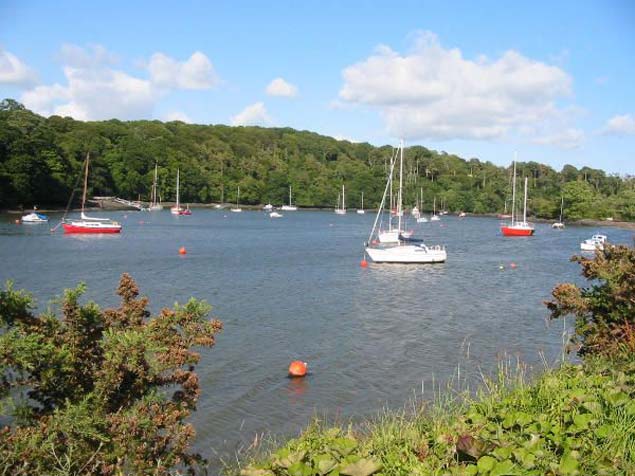 Drake’s Pool in Cork Harbour, a haven for those for whom boat-owning is a vocation
Drake’s Pool in Cork Harbour, a haven for those for whom boat-owning is a vocation
But for some, boat-owning is a vocation in itself. In fact, for some simply owning a boat is what it’s all about – the sailing is secondary. But whatever your way of looking at it, and at whatever level it’s made, the fact is that sailing is first and foremost a vehicle sport, and that involves costs which don’t arise in more straightforward athletic and other arena sports, which have the added advantage of the possibility of spectators prepared to pay to watch the action.
That generates a cash flow which – even with the most advanced new communications technology to follow a boat race – is difficult for sailing to provide. Yet despite that, sailing requires a significant capital outlay at some level, with a continuing rate of expenditure for it to happen at all.
The problem is rapidly exacerbated when international competition is expected as part of the programme, For sure, we can get reasonably inexpensive sailing if we stay at home on our relatively sparsely-populated little island with its wide choice of natural harbours, and freely available sailing water.
But if we seek the intensive sailing competition which is more readily available in the sailing areas used by highly-concentrated and affluent populations, the costs start to rise astronomically. And Ireland’s relative isolation immediately imposes that built-in travel expense at the most basic level before we’ve even got to the scene of the action.
The challenge which this poses was highlighted a month ago when Irish Sailing invited expressions of interests from individuals and teams – crews if you prefer – who might commit towards a campaign which could result in selection to sail for Ireland in the proposed two-person offshore racer – one woman, one man – which will feature in the 2024 Paris Olympics.
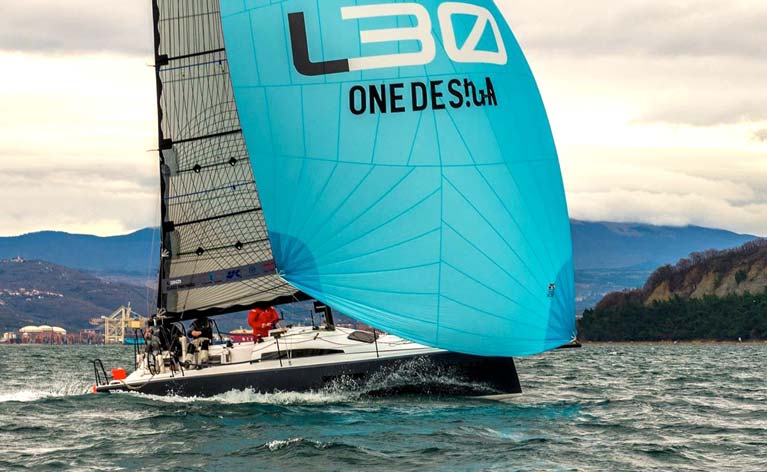 Designed by Olympic and Volvo Racer Rodion Luka of Ukraine, the L30 will be used for the World Offshore Championship 2020 in Malta in October
Designed by Olympic and Volvo Racer Rodion Luka of Ukraine, the L30 will be used for the World Offshore Championship 2020 in Malta in October
The sailing events in 2024 will be staged at Marseilles. It’s a significant distance from the main Olympic focus in Paris, but as it will involve racing on Mediterranean waters, 2020’s Offshore World Championship in concert with the Middle Sea Race in Malta at the end of October is seen as part of the buildup.
Irish Sailing made it clear that at the moment no funds are available for this new area for Olympic sailing, and with the level of longterm commitment involved, coupled with the annual Christmas/New Year hiatus in any official administration, we would not expect an announcement of definite plans at this early juncture.
But what it does mean is that there will be a clearcut regatta structure with boats of the Ukrainian Rodion Luka-designed L30 class available in Malta in the Autumn, and inevitably the overall framework of the new Olympic class circuit will draw on experience gained by the French offshore racing experience over fifty years and more in organising events like the Figaro, the MiniTransat and other majors where Open 40s and IMOCA 60s feature prominently.
Thus yet again we’ve to face the reality that any young Irish sailor keen to make the grade on the international offshore scene as an individual achiever - rather than as a professional crewmember - has to do it through the highly-structured French setup, as is currently seen with Tom Dolan and Joan Mulloy with the Figaro circuit, where Conor Fogerty is also involved.
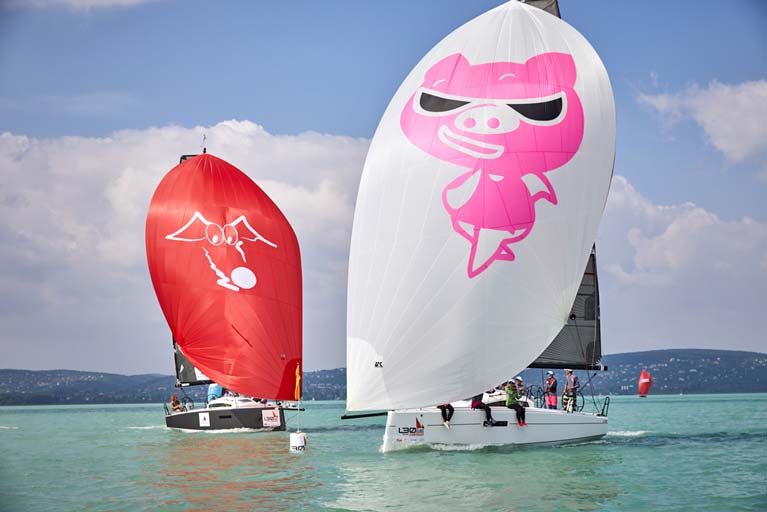 The L30 is multi-purpose, and like the JPK range, it aims to provide a genuine cruiser within the racer parameters.
The L30 is multi-purpose, and like the JPK range, it aims to provide a genuine cruiser within the racer parameters.
As for the additional cohort which will emerge from the Expression of Interest invitation, we would hope to see the names of Dillon, Rumball, O’Leary, Kenefick and others appear. But until the list is made official, we can think of many perfectly valid reasons why some top sailors of proven offshore ability would react with: “Thanks, but no thanks”.
For inevitably, the new Olympic offshore racing project will see increasingly complex official administration and detailed multi-media coverage, such that the tone of the event is beginning to seem a whole world away from the almost buccaneering atmosphere which prevails around established offshore classics, where larger-than-life characters put together colourful campaigns which reflect individual flair, enormous energy, and maybe very deep pockets too.
It’s a scenario that has seen imaginative solutions which achieved success in times past. But equally sailing history reveals occasions when possible solutions to the challenge of long-distance campaigns were less than satisfactory. To revert to the Olympics for one instance, back in 1964, the first Japanese Olympics post World War II were staged in Tokyo.
In its favour, it has to be said the event was staged in late October, when the weather is much less oppressively hot and humid than will be the case in July this year. But for the small Irish sailing team in 1964 of a Dragon skippered by Eddie Kelliher and crewed by Rob d’Alton and Harry Maguire, and a Finn sailed by Johnny Hooper, the sheer distance and the paucity of resources proved a major drawback.
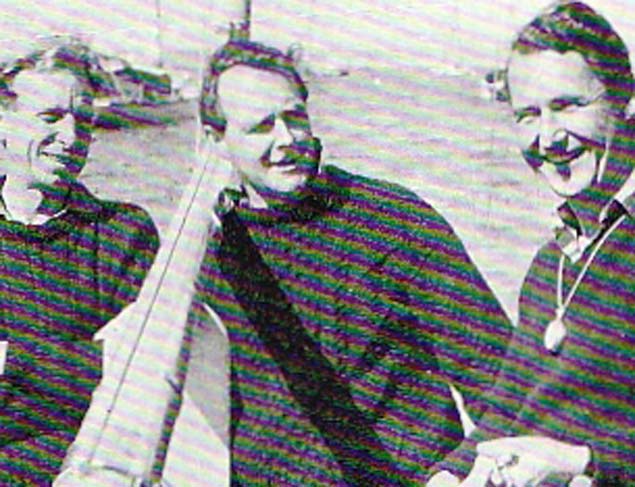 Ireland’s 1964 Olympic Dragon crew in Japan were (left to right) Rob d’Alton, Harry Maguire, and skipper Eddie Kelliher.
Ireland’s 1964 Olympic Dragon crew in Japan were (left to right) Rob d’Alton, Harry Maguire, and skipper Eddie Kelliher.
There was no question of shipping Kelliher’s successful Dragon Ysolde to Japan, so – like three other far-travelling teams - they took up the offer of a boat chartered from the small Dragon fleet in Japan, and brought their own sails. But once there, it emerged that the chartered boat had a mast so flawed that they had to scour the store-yard in search of a replacement, and as soon as the boat was put afloat it was discovered that the rudder was so faulty that they’d to lift out again and work round the clock in order to be able to sail.
Not surprisingly the boat’s performance overall was woeful, yet despite that they were usually in the frame in the early stages, getting good starts, and managing in one race to be first at the windward mark. But at the end, as Team Manager Leo Flanagan of Skerries reported, while they did finish as best overall of all the chartered boats, any future involvement in the Olympics must necessarily involve bringing the team’s own boat, as the three medallists had boats which were in a league of their own.
Fifty-six years on, and the Dragon class is Olympic sailing history, while thriving as never before as a private International One Design boat in its own closed circuit. As for the Olympic ideal, that is now for the host country to supply all boats on site for total uniformity, in the expectation that crews will already be well experienced in the boat types either through fleets in their own country, or in clusters based on groups of nations.
Either way, it is going to involve Irish crews in travel and all other expenses of overseas campaigning within a framework which – with 2024 already accelerating towards us – is going to be set by the French way of doing things, but it’s going to be the French way with an even further overlay of official administration set in a very European context.
For the fact is that the French sailing scene is so large and complex that within it you can find colourful instances of creative and imaginative individuality in non-Olympic sailing, but nevertheless in the 2016 Olympic Sailing Games they returned with three medals – a Gold and two Bronzes.
It’s a respectable enough total, but not outstanding, so success for France in the additional Offshore Class to the Paris Olympics will be a matter of intense ambition. Yet it could well be that the process of getting selected for such a coveted role in a very clearly designated route to nomination will be so fierce as to be psychologically damaging.
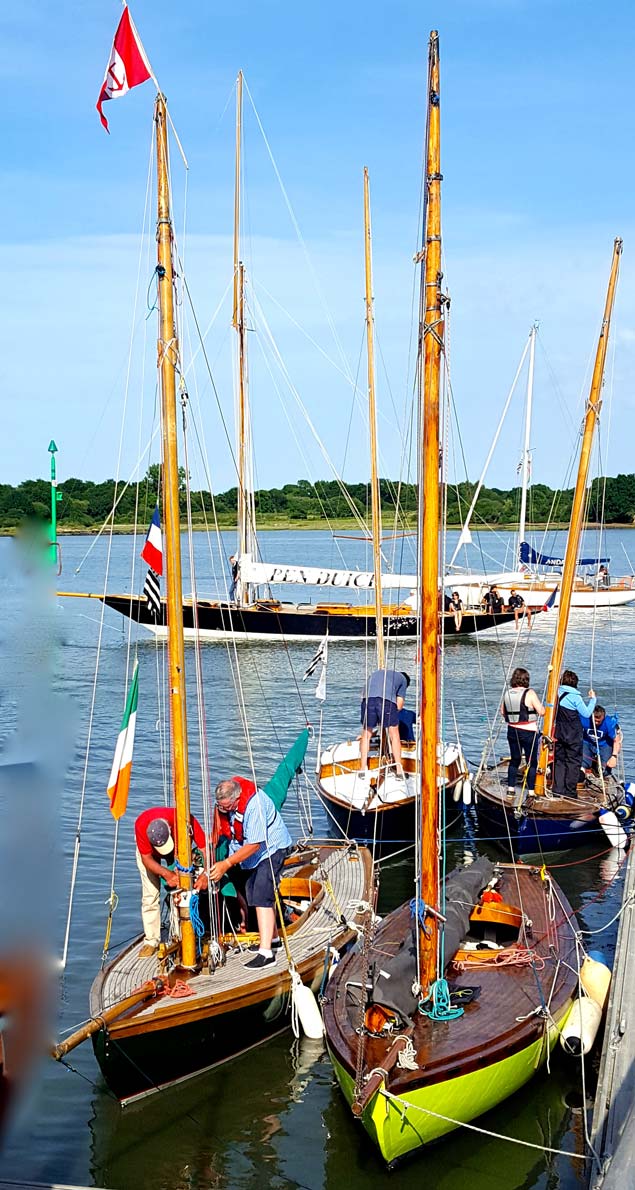 The inspiration. Eric Tabarly’s beloved classic Fife cutter Pen Duick (built in Cork Harbour in 1898) at the Festival of Sail in The Morbihan in Brittany in May 2018 with boats of the Howth 17 Class (built in Carrickfergus in 1898)
The inspiration. Eric Tabarly’s beloved classic Fife cutter Pen Duick (built in Cork Harbour in 1898) at the Festival of Sail in The Morbihan in Brittany in May 2018 with boats of the Howth 17 Class (built in Carrickfergus in 1898)
For the great joy in assessing French sailing achievement is in relishing the unfettered inspirational individuality of the people involved, something which goes right back to the achievements of Eric Tabarly and beyond. These days, the spirit is well evoked by many top sailors, but one whose has genius in finding visionary logistical solutions on a high level is Gery Trentesaux.
We’re reminded of this with the news that his multiple-race-winning First 40 of ten years ago is joining the fleet in Dublin Bay. For although most folk will assure you that it is wellnigh impossible to get the mighty firm of Beneteau to change the specification of any of their middle range boats during construction, as the boat coming to Dublin Bay proves, the bould Gery was able to get them to give it a special hull lay-up and a completely new keel design, so this is no ordinary First 40.
After that, there was a meeting of minds when Gery linked up with boat-builder Jean-Pierre Kelbert, and he took the then-new JPK 10.80 to Cowes Week, where the hottest boat in the Solent was Adam Gosling’s Corby 36 Yes!. Once upon a time she was Peter Wilson’s Mustang Sally based in Howth, but in Cowes had been given a complete makeover to become the new Yes!, and Cowes Week champion two years running.
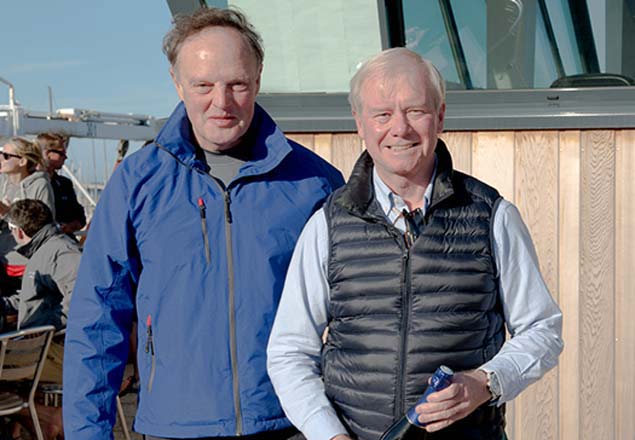 Ireland’s Michael Boyd (when Commodore of the RORC) with Gery Trentesaux
Ireland’s Michael Boyd (when Commodore of the RORC) with Gery Trentesaux
Things seemed to be following the same route the following year when Yes! and the new JPK arrived together at the weather mark in the first race, and then set off on a spinnaker reach, with the French boat’s spinnaker being trimmed by an amiable-looking bald guy smoking a pipe. By the time they reached the next mark, the JPK was at least a quarter of a mile ahead, without much apparent effort.
It was the fact that the bald guy felt relaxed enough to be calmly smoking pipe that did it. A new Yes!, a dark blue JPK 10.80 designed only for day racing, was soon on the way, and she launched her career by winning overall in the Round the Island Race the following year with Nin O’Leary calling the shots.
But Gery Trentesaux had by this time moved on, with his JPK 10.80 winning the Fastnet Race overall, and he soon had an idea of purest logistical genius. The JPK 10.80 really is a genuine cruiser-racer, and one of the boats was cruising the Pacific. Her owners were persuaded to shape their course for Sydney, where Gery and his crew were waiting with a completely new wardrobe of top racing sails, all nicely in time for the Rolex Sydney-Hobart Race 2015.
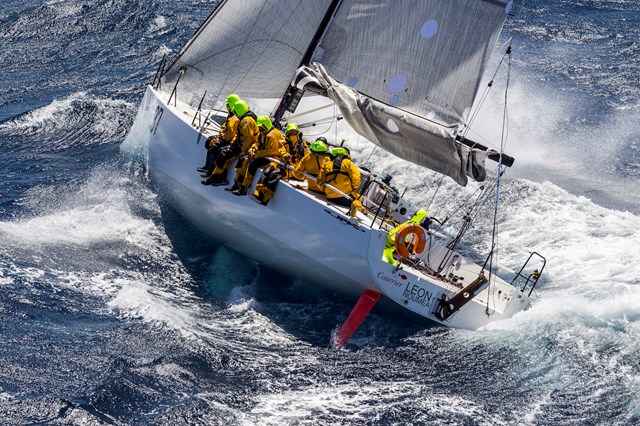 Same name, different boat – Gery Trentesaux’s borrowed JPK 10.80 Courier de Leon (with a Pacific Islands port of registry in Noumea) on her way to second overall in the 2015 Rolex Sydney-Hobart. Photo Rolex/Borlenghi
Same name, different boat – Gery Trentesaux’s borrowed JPK 10.80 Courier de Leon (with a Pacific Islands port of registry in Noumea) on her way to second overall in the 2015 Rolex Sydney-Hobart. Photo Rolex/Borlenghi
It was a very elegant solution to the challenges of long-distance campaigning, and in this their first Hobart Race, they were rewarded by taking second overall, a success which added to the mythology of the JPK story, which now includes Rolex Middle Sea Race wins and class dominance in the 2019 Rolex Fastnet Race, while last month’s Paris Boat Show saw Jean-Pierre Kelbert unveil the model of his latest baby, the JPK 10.30.
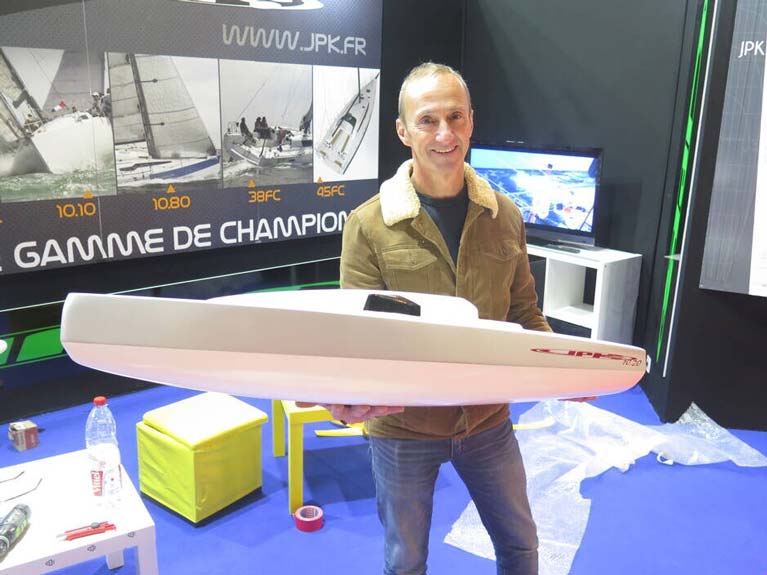 Jean-Pierre Kelbert with the model of his new JPK 10.30 at last month’s Paris Boat Show
Jean-Pierre Kelbert with the model of his new JPK 10.30 at last month’s Paris Boat Show
Other French international campaigners have come up with other solutions to the challenges of a privately-funded campaign in the Sydney-Hobart Race, and the recent 2019 race saw an interesting one with Frederic Puzin’s Ker 46 Daguet.
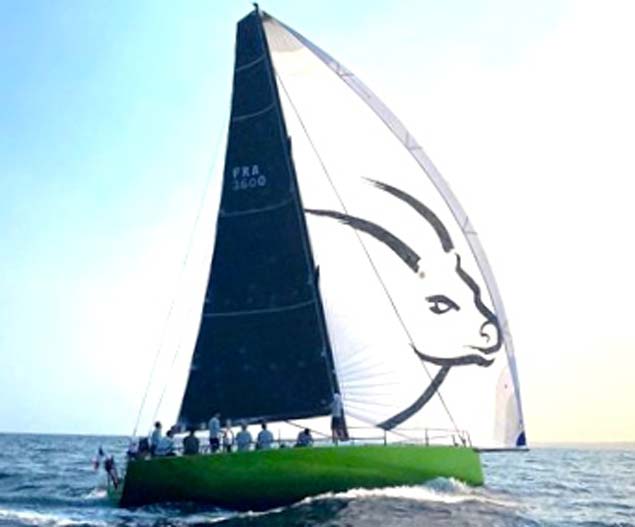 The Ker 46 Daguet (formerly Patrice) in training for the Sydney-Hobart race
The Ker 46 Daguet (formerly Patrice) in training for the Sydney-Hobart race
Puzin won the French Mediterranean Division 1 IRC championship in 2017 with his actively-campaigned Mylius 50 of the same name. But he reckoned that the hassle of getting the boat to Australia was out-weighed by the possibilities of having his own boat Down Under, so he bought the successful Sydney-based Ker 46 Patrice and after a massive re-vamp she re-appeared as the very green (as in leprechaun green) Daguet 3, racing to Hobart with a crew of several greats of French sailing such as Nicolas Troussel, Thomas Rouxel, and Sam Goodchild on board.
They certainly had their moments in the recent Hobart dash, giving Ichi Ban a hard time at one stage, and being indicated as overall leader at another. But in the end while they’d a first in ORCi-Div 2 and a fourth in IRC–Div 2, the relentless Sydney-Hobart grinding machine pushed them down to 29th overall in IRC.
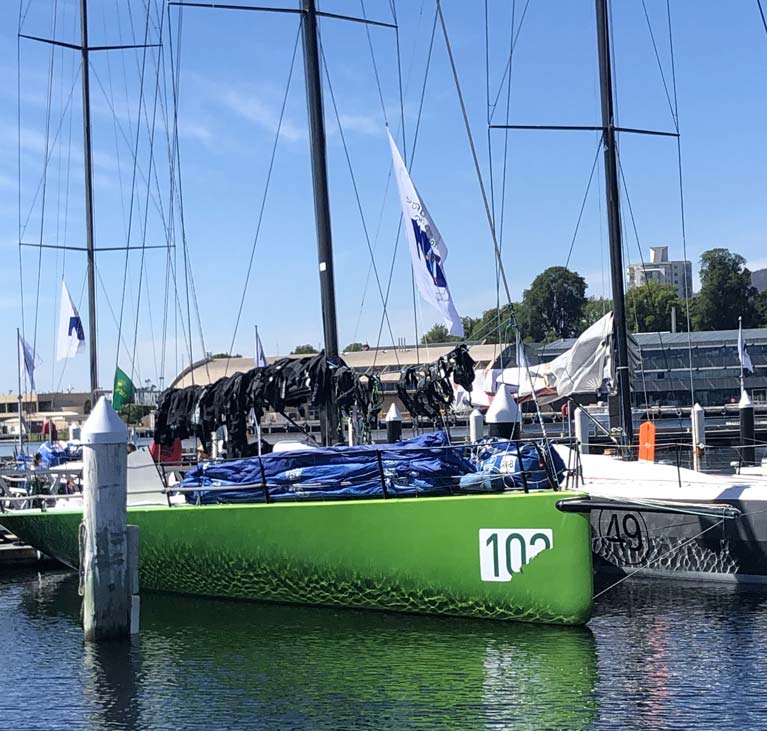 Daguet berthed in Hobart, where she acquired the nickname of Kermit. Photo: Ian Malcolm
Daguet berthed in Hobart, where she acquired the nickname of Kermit. Photo: Ian Malcolm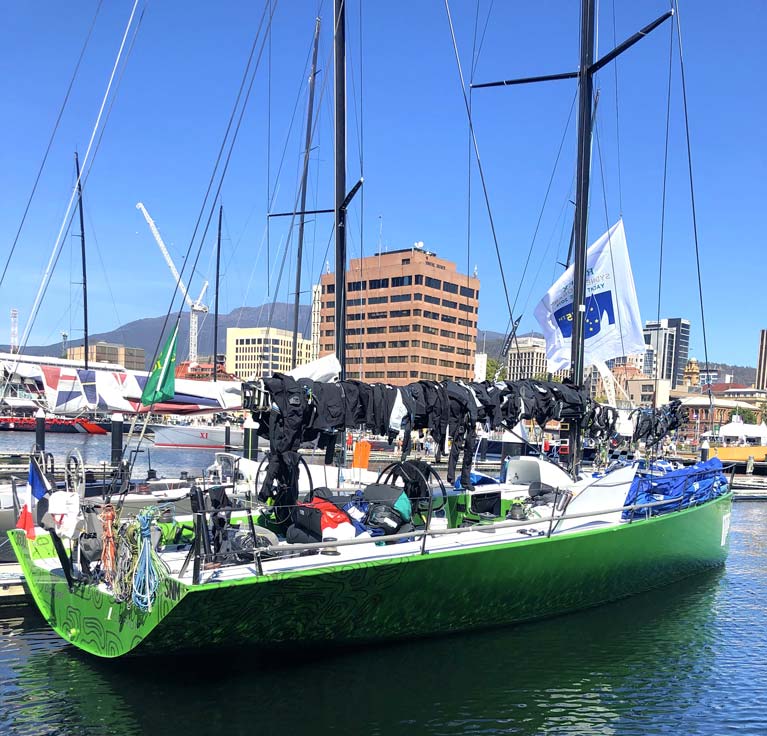 Daguet in Hobart. She may have slipped down the rankings after being first at one stage, but when the race is over the boat and gear still have to be cleaned, dried and stowed. Photo: Ian Malcolm
Daguet in Hobart. She may have slipped down the rankings after being first at one stage, but when the race is over the boat and gear still have to be cleaned, dried and stowed. Photo: Ian Malcolm
Nevertheless, French offshore racing now has a competitive proposition based in Australia and ready to go, and we may hear more of Daguet 3 in the months ahead. Meanwhile in Hobart, that totally green shade of green did not go unremarked, and the unfortunate Daguet 3 found herself nick-named Kermit, a bit of drollery which works very well at several levels, but none of them is politically correct in these very polite times…
Rio Silver Medalist Annalise Murphy is recording some encouraging results at the Australian Laser National Championships this weekend.
In one of her first major regattas since returning to the Laser last September, in a bid for the Irish Tokyo slot, the National Yacht club star is the top Irish woman from four contesting the championships at the Sandringham Yacht Club in Melbourne.
Murphy has counted a race win but also a black flag penalty to be placed 19th overall so far in the championships that have featured strong and light winds and some 'chilly' conditions.
The Men's and Women's Laser Radial classes are sailing together, split into Yellow and Purple fleets.
With the Australian selection for Tokyo 2020 still to be decided, Queenslander Mara Stransky struck an early blow with two wins in Purple fleet. Yumiko Tombe of Japan was second and Marie Burrue (FRA) was third in the first race. All three were pleased to have beaten Rio 2016 gold medallist, Marit Bouwmeester, who finished fifth overall and fourth woman.
Murphy's rivals for the Tokyo berth (that will be decided in selection trials later this year) are all sailing in the gold fleet and currently placed as follows: Aoife Hopkins 32nd, Aisling Keller 37th and Eve McMahon 60th.
The championships were subject to a protest by a competitor under 'Air quality' but the complaint was dismissed.
Results here
RYA Calls For Sailors for Britain's Double-handed Olympic Mixed Offshore Keelboat
The RYA is on the hunt for sailors and boat owners interested in the new double-handed mixed offshore event that will debut at the Paris 2024 Olympics.
This exciting discipline will see mixed pairs battle it out over a 4-day offshore race in a new showcase for the sport.
As Afloat reported earlier, planning for Paris 2024 is already underway. The RYA has registered an entry for a British team in the 2020 World Sailing Offshore World Championship (OWC), held in conjunction with the Rolex Middle Sea Race.
The RYA would now like to hear from any motivated and experienced sailors interested in trying double-handed offshore sailing, and they are also keen to hear from any boat owners who may either be looking for a racing partner or prepared to loan or charter a suitable boat to others.
Jack Fenwick, RYA Keelboat Manager, is hoping to bring interested parties together in early 2020 with a view to running doublehanded offshore taster sessions and training next spring.
"Double-handed offshore sailing could appeal to a wide range of people from professional sailors to existing or former international sailors, or perhaps even those just graduating from our RYA British Keelboat Academy," he said.
"At this stage we would like to hear from as many people as possible to try and build a database of interested parties. We would particularly like to hear from yacht owners who might be looking for partners to get afloat and give it a try."
In a vote of confidence for the existing RORC racing series, the RYA has announced that selection for the OWC, taking place in Malta in October 2020 in L30 yachts, will be based solely on the popular RORC Channel Race which starts from Cowes on August 1.
"We believe the existing RORC Racing calendar of events will provide excellent training opportunities and should be a huge advantage to British medal hopes in 2024. It would be great to see lots of teams fighting it out for the double-handed trophies within the RORC's Season Points Championship" said RYA Director of Racing, Ian Walker.
RORC Racing Manager Chris Stone explained: "In 2020 the Channel Race will run as normal for our IRC rated fleet but we will extend the race for those double-handed mixed entries who wish to be considered in the RYA selection for the OWC. The intention is for this selection event to best replicate the duration of the OWC which is likely to be 3 or 4 days."
RORC racing is IRC rated and not one design so in order to best reflect the criteria of the new Olympic equipment, the RYA selection for the OWC will only be open to fixed keel, monohulls within a proposed IRC rating band between 0.990 and 1.055 (subject to confirmation).
Ian Walker: "We need to strike a balance between keeping the rating band as narrow as possible to minimise the impact of the boats' rating differences on the results and making the selection as accessible as possible for a range of suitable existing boats. We will confirm the rating band after any revisions to the IRC rule for 2020."
The official selection policy will be published by 1 March 2020 but anybody interested in getting involved in double-handed, mixed offshore sailing is warmly encouraged to register their interest by sending an e-mail containing details of their sailing experience, aspirations and their boat (if they have one) to: [email protected].
If more than 20 nations enter the OWC then there will need to be a country qualification event in Europe in May / June 2020. Britain would then need to send a representative team to aim to qualify a place for Britain for the OWC in Malta and an announcement will be made on how these representatives will be selected once the details are announced by World Sailing in due course.
Irish Sailing 49er Teams Seek Olympic Qualification in Auckland
A top-eight position needed to secure Ireland’s single place at next year's Tokyo Olympics will be the aim at the 2019 49er World Championship in Auckland, New Zealand next month.
It's going to be a big ask for the two Irish teams who have already departed for New Zealand in what is one of the final chances for 2020 Olympic qualification.
As many as 400 of the world’s best sailors, including multiple champions New Zealand’s Peter Burling and Blair Tuke, will compete at the world championships at the Royal Akarana Yacht Club from December 3-8. The event will be broadcast by Sky Sports.
Both Ryan Seaton (a double Olympian) and Seafra Guilfoyle and rivals Robert Dickson and Sean Waddilove have each shown how capable they are this season at separate events but the competition will not get any hotter than December's fleet in Auckland.
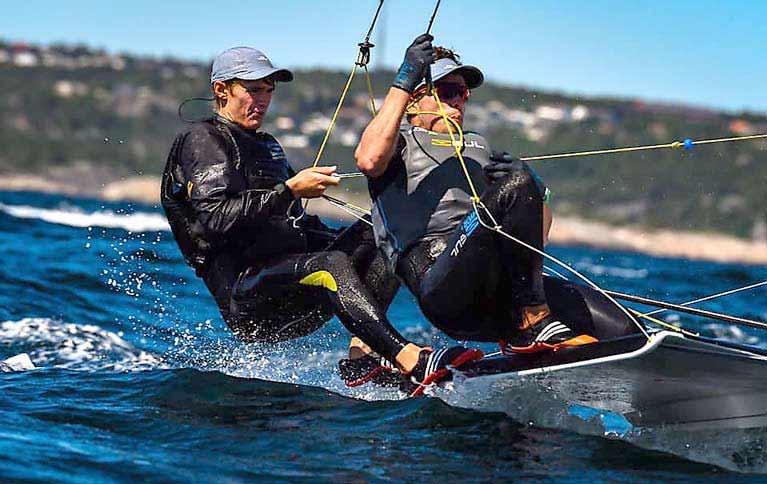 Robert Dickson and Sean Waddilove in bronze medal form at the U23 Worlds in Norway in July Photo: Martina Orsini
Robert Dickson and Sean Waddilove in bronze medal form at the U23 Worlds in Norway in July Photo: Martina Orsini
In August, as Afloat reported at the time, Seaton and Guilfoyle put a patch of inconsistent sailing behind them at the World Sailing World Cup in Enoshima, venue for the 2020 Olympic sailing regatta, to finish as medal race finalists and in tenth position overall. Likewise, in another fine display, defending champions Robert Dickson and Sean Waddilove of Howth Yacht Club put in an outstanding U23 49er World Championship campaign to win a bronze medal in Norway in July.
So with both teams showing great potential to make the grade, it will be interesting to see who can perform when it really matters in Auckland.
New Irish 49er coach
The team also have a new coach in Matt McGovern. The Bangor County Down sailor is Ryan Seaton's old crew from London and Rio. McGovern, who in 2017 embarked on his own campaign for Tokyo with Strangford's Robbie Gilmore. He takes on the coaching role after moving into an RYA NI High-Performance management position.




























